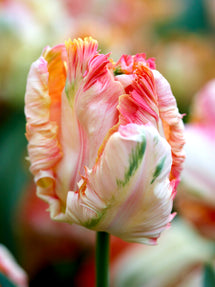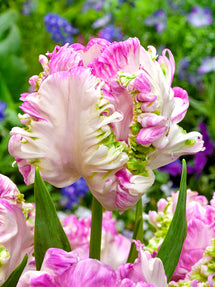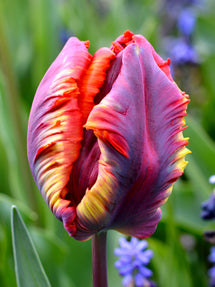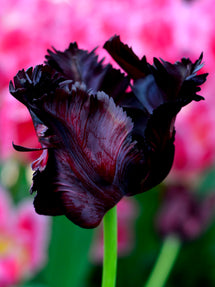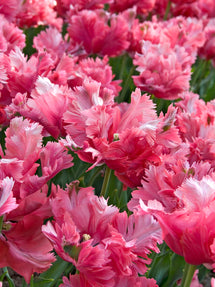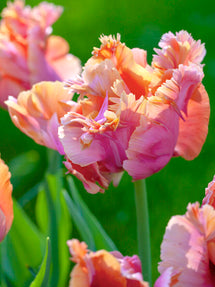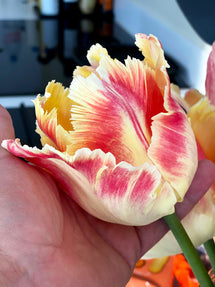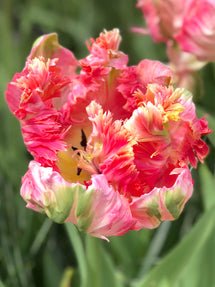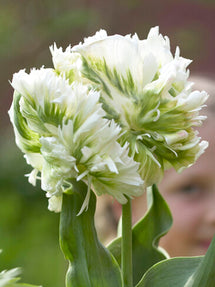Parrot Tulips
Create A Dramatic, Striking Garden Display With Parrot Tulip Bulbs
Parrot Tulips are one of the most exotic and eye-catching types of Tulips you can plant in your garden. Known for their ruffled petals, scalloped plumage and vibrant, multicolored hues, they offer an extravagant appearance that no other flower can match. Whether you're a seasoned gardener or just beginning, these bulbs are an excellent choice for transforming your spring garden into a lively, dramatic display. At DutchGrown, we offer only the finest, top-size Parrot Tulip bulbs for sale. Carefully selected for quality, our bulbs ensure that your garden will feature large, healthy blooms with the exotic beauty that Parrot Tulips are famous for.
Showing 1 - 9 in 9 items
PARROT TULIPS BY DUTCHGROWN™
Exotic Parrot Tulips: From Cabanna To Flamingo Queen
Parrot Tulips come in a wide range of varieties, each offering a unique look and personality. For example, the incredibly rare "Cabanna" with its extra large blooms in creamy white that are laced with green and soft pink. This variety is ideal for gardeners who want to add a bold, dramatic flair to their garden. On the other hand, the "Flamingo Queen®" features stunning soft pink cup-shaped flowers that have white overtones and green streaks.
There are many more varieties to choose from, each bringing its own charm to your garden. From soft pastels to bright, vivid colors, there is a Parrot Tulip variety to suit every style.
Creative Ways To Combine Parrot Tulips In Your Garden
Parrot Tulips are not just stunning on their own; they also work wonderfully when paired with other flowers and plants to create harmonious, captivating garden designs. To create a visually exciting display, try planting Parrot Tulips alongside other Tulips in a variety of complementary colors. Bright red, orange, and yellow Tulips, or even black Tulips make the ideal backdrop for the striking hues of the Parrot Tulips, enhancing their boldness and vibrancy.
You can also mix Parrot Tulips with other spring flowers like Daffodils, Hyacinths, or Crocuses to create a layered, dynamic garden arrangement. The contrasting colors and textures of these flowers will make the plants stand out even more. Additionally, planting them in containers or pots allows you to experiment with different combinations of flowers and easily move them around your garden to find the perfect arrangement.
How To Plant Parrot Tulip Bulbs For The Best Effect In Your Garden
Planting Parrot Tulips is simple, but knowing the right techniques ensures that you get the most out of your bulbs. So let’s get started.
Parrot Tulips are hardy in USDA zones 4 through 7. For the best results, plant your Parrot Tulip bulbs in a location with well-drained soil that receives full sun and is protected from harsh winds. The ideal planting time is between early fall and November, ensuring the bulbs have time to establish roots before the winter chill sets in. Next, make sure the soil is well-drained and plant the bulbs about 5 inches deep, spacing them 4 to 6 inches apart. After planting, water the bulbs lightly to settle the surrounding soil. To protect the bulbs over the winter, cover the area with 2 to 3 inches of organic mulch, such as shredded bark or pine needles.
As the flowers begin to sprout in the spring, remove the mulch. At this point, you can start supplemental watering weekly until the flowers fade away. With proper care, your Parrot Tulips will reward you with vibrant, dramatic blooms during mid to late spring. Do you want to read more about this Tulip variety? Read our blog article “Featured Variety: Parrot Tulips”.
Where Can I Buy Parrot Tulips? At DutchGrown!
If you're looking to add some vibrant, exotic beauty to your garden, purchasing high-quality Parrot Tulip bulbs is a great start. At DutchGrown, you will find a carefully curated selection of the finest Parrot Tulips, chosen for their size, strength, and ability to deliver stunning blooms. We ensure that you receive only the highest quality, providing you with the best possible results in your garden. Explore our collection and discover the Tulip bulbs to elevate your spring garden. We ship throughout the US.
Frequently Asked Questions About Parrot Tulips
What Do Parrot Tulips Symbolize?
Parrot Tulips symbolize resilience and the fight for survival, as they originated from a natural mutation. Like all Tulips, they also represent deep, pure love, but with a unique twist. The different colors of Parrot Tulips carry additional meanings: white Tulips symbolize, for example, forgiveness and respect.
Will Parrot Tulips Come Back Every Year?
Parrot Tulips are technically perennials, but they may not return reliably every year unless conditions are ideal (which is often not the case). In many regions, gardeners treat this Tulip class as annuals. For consistent, year-after-year blooms, consider planting Darwin Hybrid Tulips, which are known for their durability, vibrant color, and ability to thrive across various climates.
How Tall Do Parrot Tulips Get?
The height of Parrot Tulips depends on the variety. At DutchGrown, you will find high-quality bulbs with a top bulb size of 4–5 inches that will grow striking Parrot Tulips with a height between 16 and 20 inches tall, creating a stunning display in your garden.
When To Plant Parrot Tulip Bulbs?
The best time to plant Parrot Tulip bulbs is between early fall and November. Planting during this period allows the bulbs to establish strong roots before winter. Parrot Tulips thrive in USDA Hardiness Zones 4 through 7.
